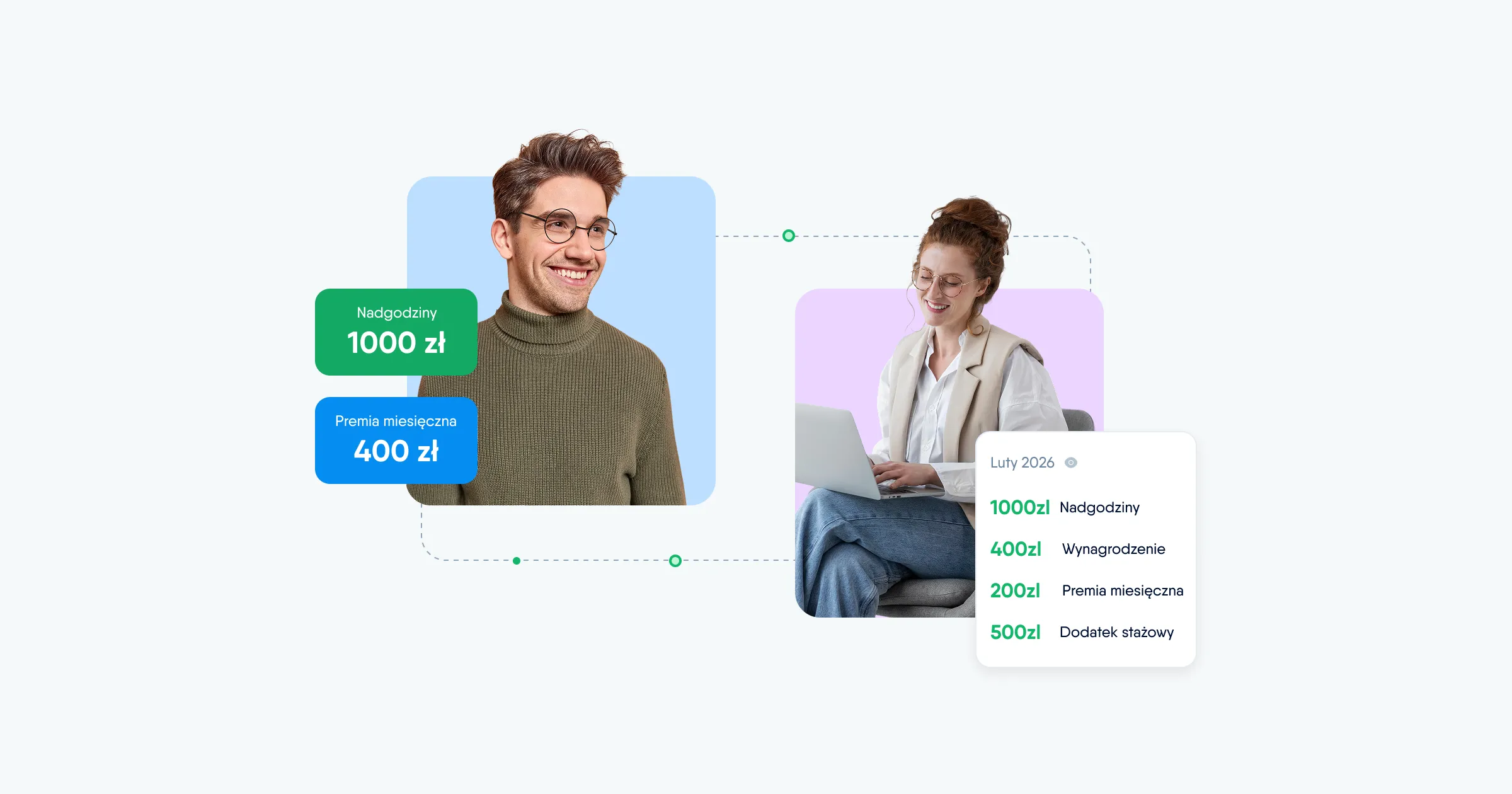
The business impact of positive employee experience
Creating a positive employee experience is one of the most important functions of HR specialists as it directly relates to the employee's life cycle, engagement, interest, and loyalty.
Experience comes from what an employee encounters in communication, solving work tasks, achieving goals, development, team activities, and so on. If healthy relationships are built between employees, between manager and employee, and between different departments and teams, the employee's experience will be enriched with positive situations that provide opportunities for learning and growth.
Conversely, if more negative situations occur during an employee's time at a company, their experience will be characterized by stress, communication obstacles, and misunderstandings. This, in turn, threatens not only the current development of the organization but also its reputation.
So how do we properly weigh the impact of employee experience? Why is it important for top management and HR specialists? Let's consider this in more detail.
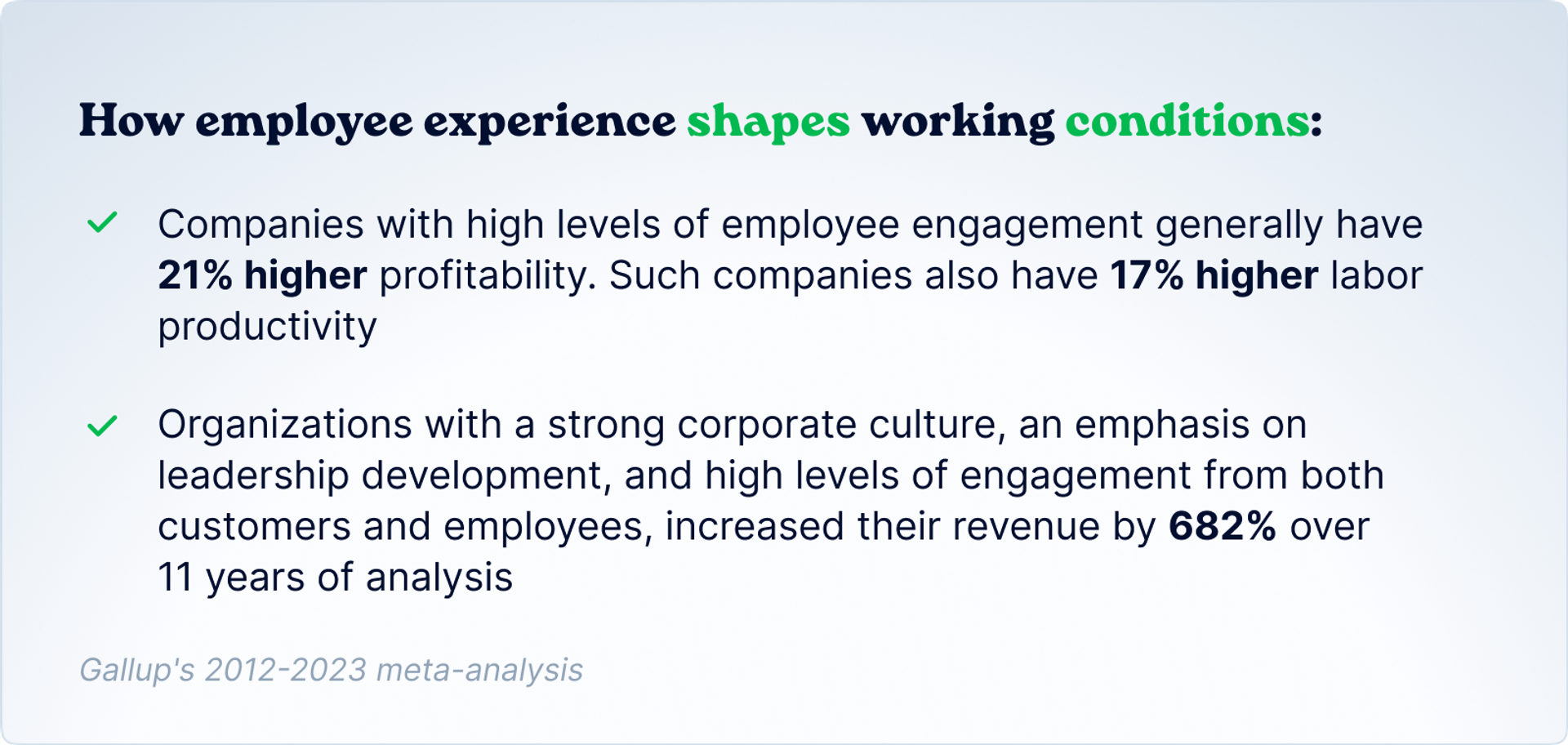
What are the stats on employee experience?
Here are a few examples of how employee experience directly shapes working conditions:
- Only 15% of employees are actively engaged in their teams, according to Gallup. Thus, up to 85% of the global workforce is either negatively or neutrally disposed towards their work.
- A 2021 study by Joblist shows that up to 73% of employees are willing to leave their current positions for a better offer, even if they are not actively seeking other jobs.
- According to Gallup's meta-analysis on employee engagement, companies with high levels of employee engagement generally have 21% higher profitability. Such companies also have 17% higher labor productivity.
- Gallup's multi-year study showed that organizations with a strong corporate culture, an emphasis on leadership development, and high levels of gratitude and engagement from both customers and employees, increased their revenue by 682% over 11 years.
- In a SHRM survey on rewards and recognition, 43% of respondents preferred private but mandatory praise from their supervisor. Also, 10% chose public recognition in the presence of other colleagues, and 9% preferred private written recognition.
So it’s clear that improving employee experience is extremely important for creating a positive working environment, one that leads to growth. That’s the what, let’s explore the how of improving employee experiences.
Define the stages of your employee life cycle
Start by defining your employee life cycle and its stages. The standard life cycle includes hiring, development, retention, and separation, but there are nuances:
- Hiring: Provide adaptation, mentoring, and on-hands experience at the company to allow new employees to start working with alacrity. During the adaptation process employees should realize that they have made the right choice by joining your team.
- Development: Offer opportunities for mentoring, performance management, coaching, and professional growth. This includes promotions and salary increases associated with changes in job levels or roles. Positive experiences here can motivate increased productivity and inspire staff to achieve your company's strategic goals.
- Retention: Work on good relationships with your best talent and build trust. This is crucial for employees to gain experience that will encourage them to stay in your organization for as long as possible.
- Separation: Understand and evaluate the reasons why employees are leaving. During separation, delve into questions about their experience. What were the positives of their work, and what were the negatives?
You also need to determine the ideal touch points at each stage. For example, in the case of onboarding, touch points may include:
- A welcome letter or message from the organization
- A meeting or message from a manager before the first day of work
- Instructions on what the first day or week will entail
- First day experience (orientation, team introductions, equipment issuance)
- Expectations for the first 30, 60, and 90 days of work
- Sequential scheduling of 1-on-1 meetings with managers
- Scheduling meetings with key peers
The employee life cycle stages are just the beginning of understanding the entire experience that impacts them. The next step is understanding the needs of your employees.
How to develop a positive employee experience
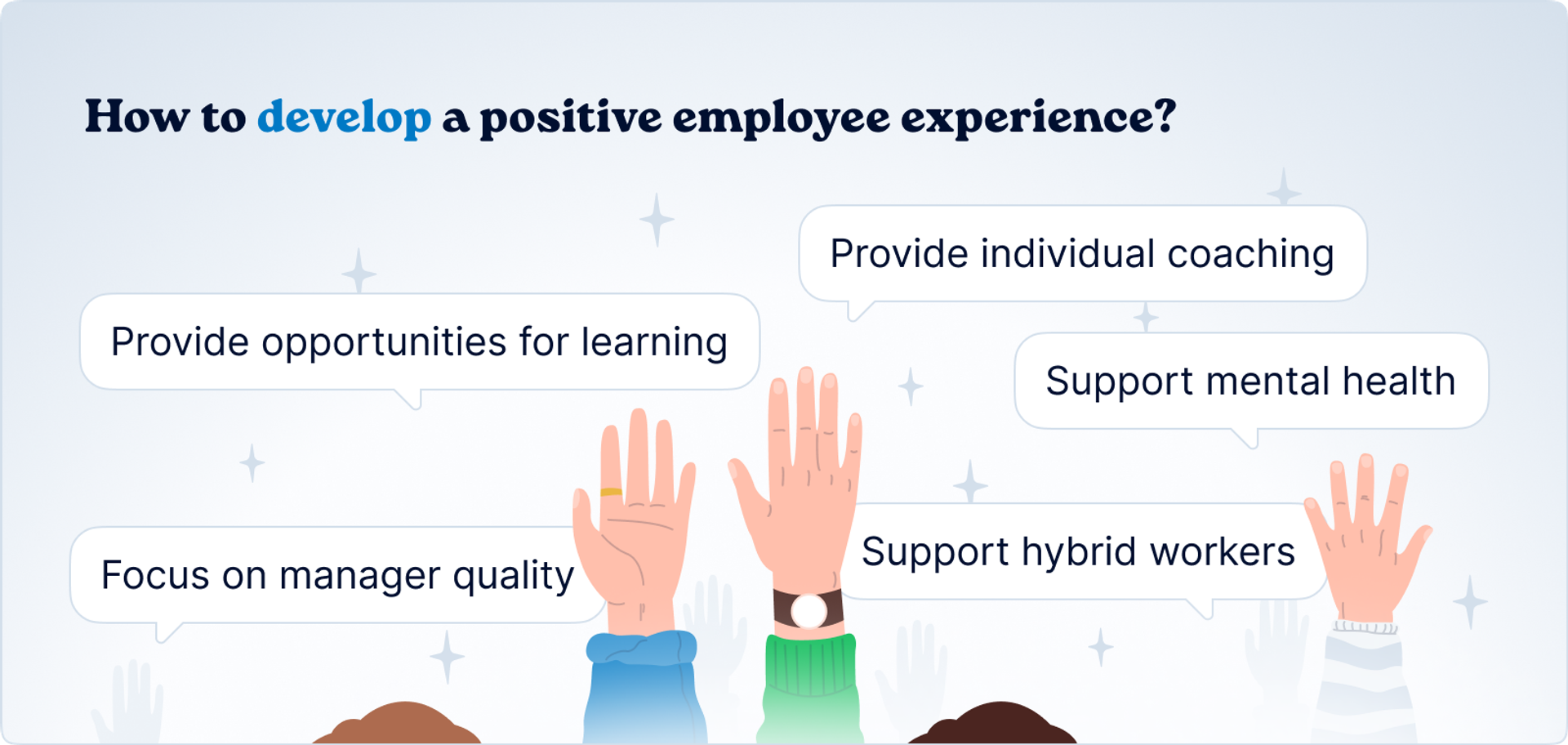
Your organization can easily find ways to improve employee experience, and there are five ways to achieve this successfully.
1. Provide opportunities for learning and development
Access to learning and development opportunities is critically important as its overall contribution to the life cycle model is 31% of the process.
The pandemic has allowed employees to look at their own career as they have never done before. Growth-oriented employees require access to additional opportunities, and without developing them, they will look for work elsewhere.
2. Focus on manager quality
Managers have an incredible impact on the employee experience. Inclusive leaders, those who are truly interested in the employee's life at work, invest the most in it.
Provide managers with opportunities to develop the skills needed to create lasting change. If your managers are not engaged in work and growth, your employees are unlikely to be engaged either.
3. Provide individual coaching
Access to coaching opportunities goes hand in hand with professional development. When employees are given the opportunity to learn and develop, your business wins too.
Consider providing your employees with access to coaching. With individual help, your employees will become more self-aware, resilient and psychologically healthy.
4. Support mental health
We are only just beginning to see the impact of COVID-19 on mental health. However, it is already known that burnout levels are rising, and employees report higher levels of stress and anxiety.
To solve this problem, organizations need to prioritize wellness programs. Think about how you can support the mental health of your employees as much as possible, for example, by providing free mental health counseling.
5. Support hybrid workers
If we learned anything from COVID-19 it's that flexibility wins everywhere and always. You can support your employees by offering them more flexibility, as this has been proven to make them more productive and psychologically healthy.
What tools help track employee experience?
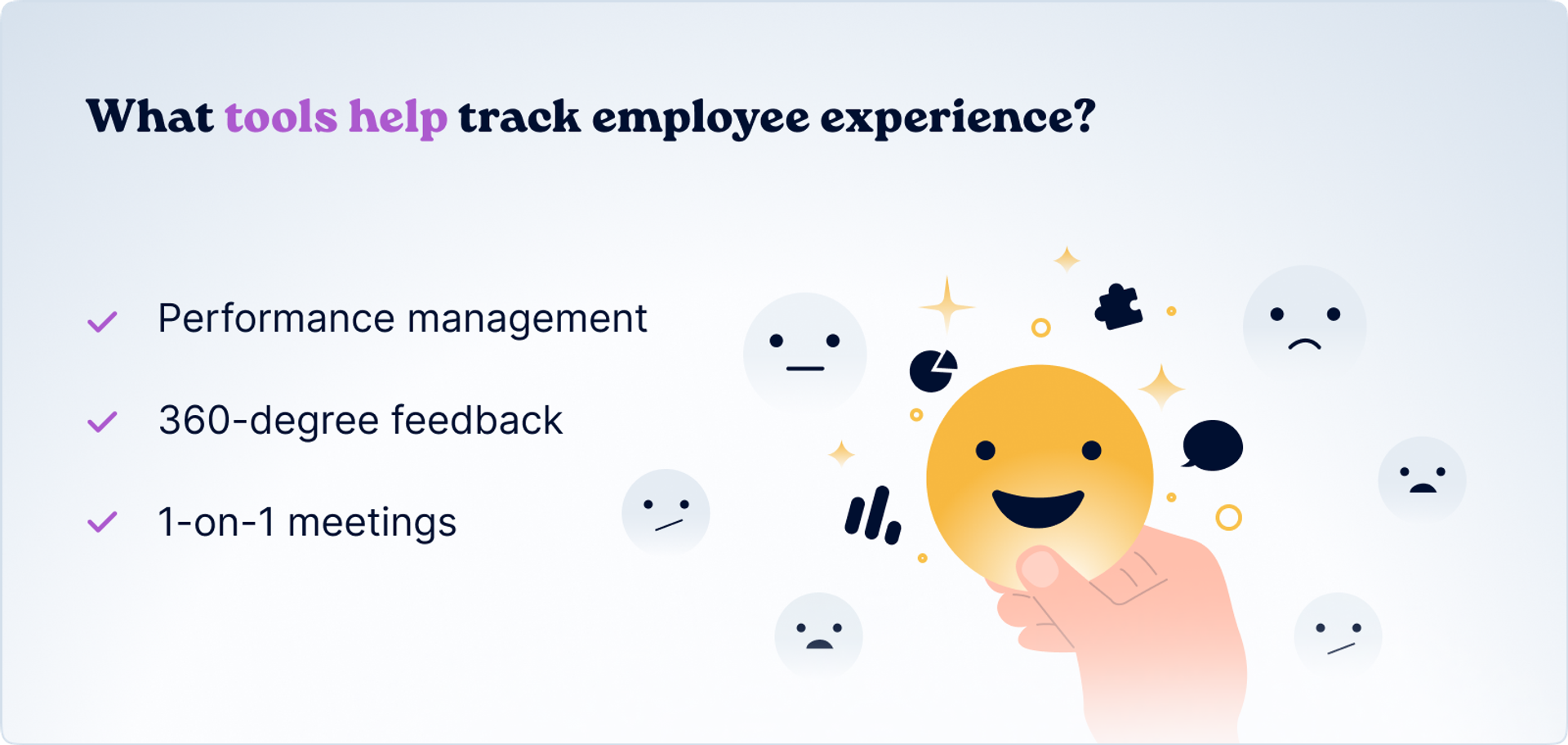
To understand if you are on the right track with employee experience, make sure you’re using the right tools and methods.
- Performance management to evaluate the development and achievements of employees.
- 360-degree feedback to gather feedback from managers, colleagues, subordinates, and others to get a complete picture of the employee experience.
- 1-on-1 meetings for communication and feedback gathering.
Although employees are not your customers or end consumers it is wise to treat their experience with the same level of attention and care. Just as a satisfied customer will return to you after good service, so too employees will stay if they have a good work experience.
In order for employee experience to positively impact on your business strategy you must listen to your employees and take action. Creating an optimal employee experience may not be easy, but it is one of the most important tasks that an organization can undertake, one that has the potential to deliver great results.
With over five years in HR tech content creation, Maria explores how technology, people, and culture shape the workplace of today. Her interests include HR, AI, IT, and personal development, and she brings a data-driven, human-centered perspective to her writing.
Get started with PeopleForce today
Automate your HR routine to create a high performance culture in your company. PeopleForce is your best HRM alternative to stay business driven but people focused.
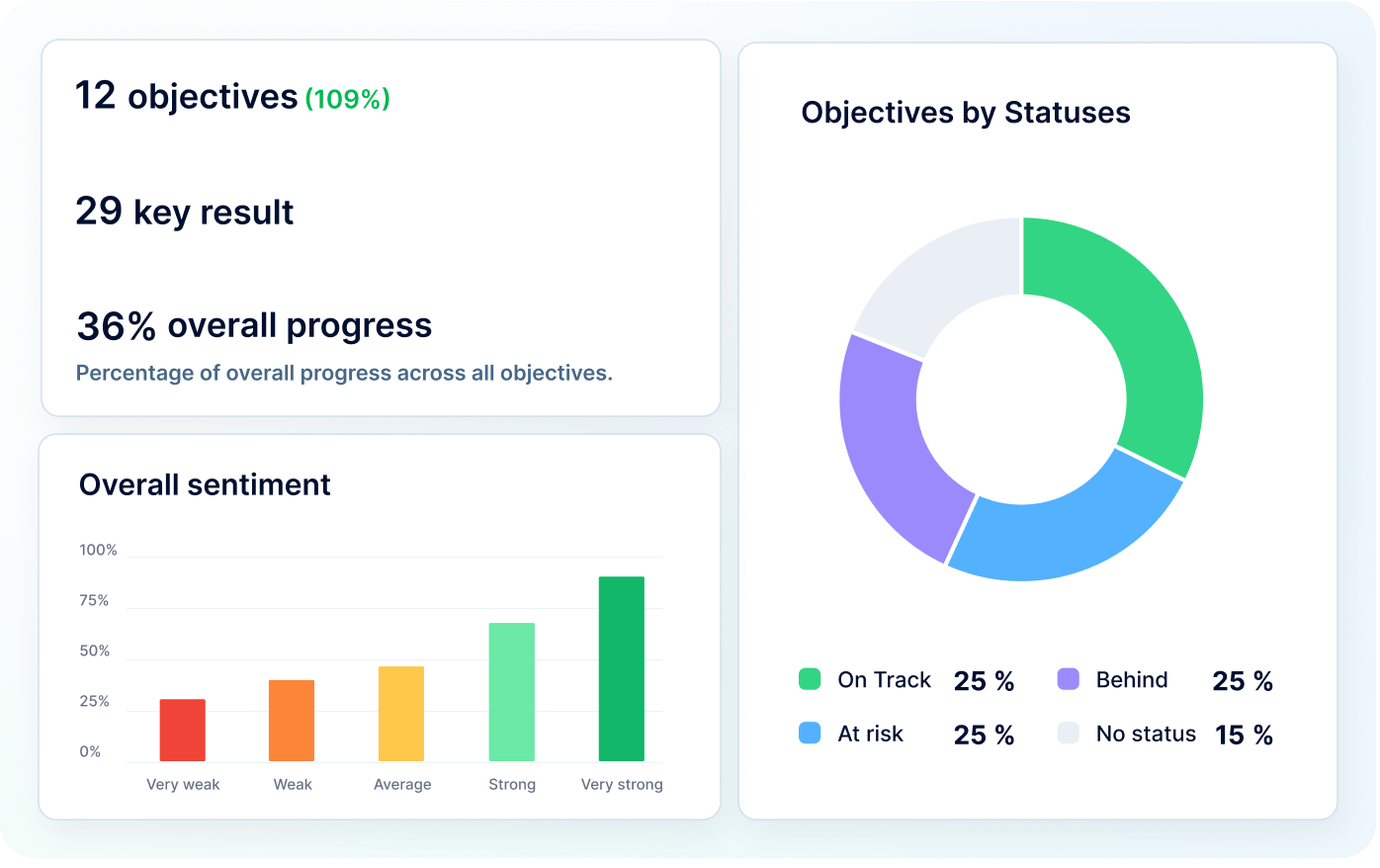
Recent articles
HR Guide to the EU Pay Transparency Directive: Expert answers
Expert answers to the most common HR questions about the EU Pay Transparency Directive. Learn what employers must prepare for — and how to stay compliant.
Top 10 ATS systems: The ultimate recruiter's guide
Looking for the best ATS? Compare the top 10 ATS systems by features, pricing, and user reviews to find the perfect hiring solution for your team.
🎉 PeopleForce Wrapped 2025: a year of HR magic
2025 wasn’t just about shipping features — it was about making HR work better at scale. Let’s unwrap everything we built together.
